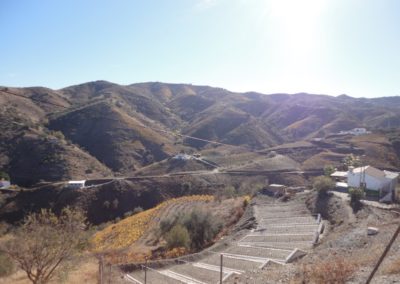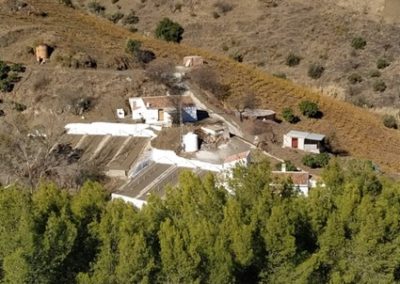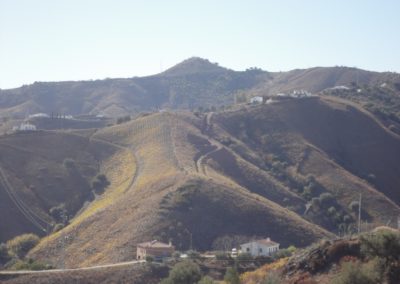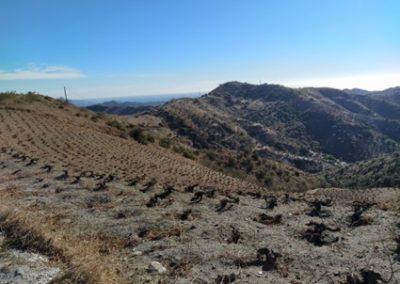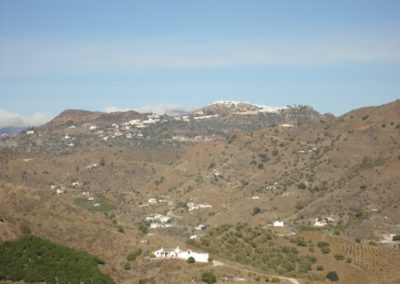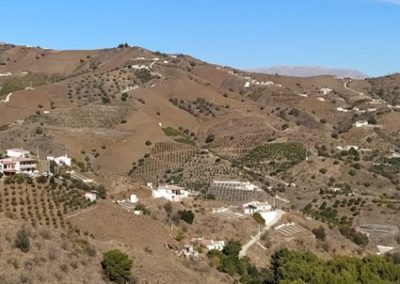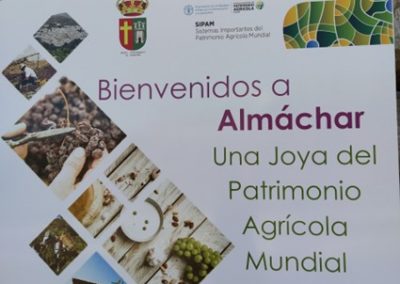Sultana grape agrosystem in the Axarquia region (Malaga)
DOI: 10.5281/zenodo.7607983
Mountain and Upland Model
Authors: Rocío Silva Pérez and Gema González Romero
Overview of SAMUTER
The Axarquia region (Malaga) is a mountainous area in the back country of one of the main international tourist enclaves (the Costa del Sol) which is also located next to the urban agglomeration of Malaga, the fifth most important demographic area in the country. The system woven around the sultana grape meets the requirements demanded of territorialised agri-food systems. The specialised literature includes vineyards among the agricultural systems of high natural value; this implies recognition of their role in the maintenance of biodiversity. The physical proximity of vineyards, grazing lands and wineries reinforces the conditions for sustainability and facilitates contacts (physical and cultural). Vineyards, grazing lands and wine cellars imbue the character of these landscapes, establish their identity roots and play a major environmental role.
1. Environmental sustainability
Coherence with agro-ecological potential and good agricultural and livestock practices (sustainability and know-how; not necessarily organic farming) and/or Inclusion in ENP, Natura 2000 Network, Biosphere Reserve, SAVN, SIPAN, others.
The sultana farming system of La Axarquía was recognised as a World Agricultural Heritage Ingenious System (GIAHS) by the FAO in April 2018. This status recognises resilient, constantly evolving agrosystems characterised by remarkable agricultural biodiversity, traditional knowledge, sustainable management, invaluable cultures and landscapes.
The sultana (agro)food system in the Axarquia region has ecological values that transcend the product and extend to the whole system. Figures on organic farming area and operators are not significant, as third party certification processes are not affordable for a labour-intensive, family farming system with low economic profitability and low capitalisation. The physical proximity of vineyards, grazing lands and wineries reinforces the conditions for sustainability and facilitates contacts (physical and cultural). Vineyards, grazing lands and wine cellars imbue the character of these landscapes, establish their identity roots and play a major environmental role. Together with the landscape, traditional agricultural techniques, based on the work carried out by animals or humans, and on practices that maintain the ecosystemic balance and optimise available resources, are presented as guarantors of environmental sustainability. The intertwining of landscape and (agro)food systems is inseparable in the case analysed.
2. Territoriality and agri-environmental policies
Designations of Origin, geographical designations and other territorial trademarks. Agri-environmental areas/agro-systems.
The territorial anchoring of the agricultural and agro-industrial components is endorsed and reinforced through the Protected Designations of Origin (PDOs), which identify both the production and the processing and preparation of a product to a territory, making it unique. The Axarquia SIPAM site is affected by three PDOs, Pasas de Málaga; Málaga and Sierras de Málaga; the first covers sultanas and the others wines. The requirements set out in the specifications of the PDO Pasas de Málaga and its Regulatory Council regarding the type of agricultural practices and the sultana production system are not only perpetuating sustainable agriculture and a system of manual and artisanal production, but also preserving a unique landscape.
3. Relations between production, processing, marketing and consumption
Proximity relations and forms of integration between agri-food production and processing industry; distribution networks, short circuits and consumption groups (especially in metropolitan areas and urban regions; “supply basins”).
The sultana grape agri-food system is complex. The agricultural production link covers an area of 1,113 ha (up to 2,650 ha including vineyards for wine). They are family farms with extreme smallholdings: each vine-grower farms an average of 1.22 ha, distributed over 3 plots (0.41 ha each) (Consejo Regulador de la DOP pasas de Málaga, 2021). The work is carried out manually and animal traction dominates (due to the demands of the terrain).
Processing takes place on the holdings themselves, in the case of sun-dried raisined grapes in raisin vats: a total of 4,593 (Consejería de Agricultura, Pesca y Desarrollo Rural, 2017) and around 5 raisin vats/farm; in the case of wine grapes, processing takes place in wineries located in population centres (18 companies; IECA, 2021).
The grapes are crushed in on-farm presses. Grading takes place in first-grade cooperatives. The second-tier cooperative UCOPAXA serves as the backbone of this predominantly smallholder system, comprising eight first-tier cooperatives and 700 farmers.
The Malaga Raisins PDO plays a key role: a total of 942 ha are marketed under it, around 85% of the entire area of sultanas in the region (Regulatory Council of the Malaga Raisins PDO, 2021).
Unlike other agricultural products, the marketing does not increase the price excessively. The bulk of the sultana market is national and under the PDO Raisins of Malaga, only 4% was sold abroad (Holland, Portugal, Switzerland and Japan (Regulatory Council PDO Raisins of Malaga; Malaga and Sierras de Malaga, 2021).
4. Good governance
Participation and involvement of actors in the agri-food system. Councils and other institutions for participation and management in DOs, DGs and other territorial brands; entities for participation and management of protected areas in relation to agricultural activities; agricultural associations, Local Development Groups and similar. Agri-food groups, consumer groups and networks, etc.
The Axarquia region is characterised by a wide range of social and relational capital, and up to seven basic profiles of actors can be identified (professional agricultural organisations, business associations, bodies regulating economic activity, agencies for the promotion of development, public bodies, research centres and associations for the conservation of heritage). These include those created in the 1980s and 1990s to promote development (Association for the Promotion of Tourism in the Axarquia and the Axarquia Rural Development Centre (CEDER-Axarquia), which have been joined in the last decade by the Regulatory Council of the Designation of Origin Raisins of Malaga, the Moscatel Association and the SIPAM Association.
The social and relational capital of the agents involved in the sultana (agro)food system has been strengthened as a result of SIPAM recognition. Both the GIAHS application process and the implementation of the action plan have required a high degree of territorial governance, requiring multi-level coordination between actors, companies and local institutions, in a context of information asymmetry and the existence of numerous decision-makers.

